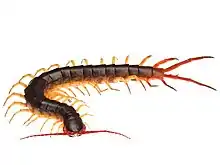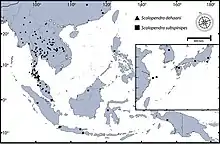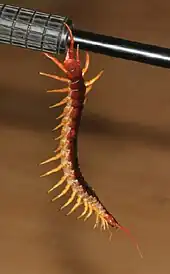Scolopendra dehaani
Scolopendra dehaani, common name Giant Vietnamese centipede, is a large Scolopendrid centipede found across Mainland Southeast Asia.[2][3] It is also found in India, Japan, Hong Kong, and the Andaman and Nicobar Islands.[1]
| Giant Vietnamese centipede | |
|---|---|
 | |
| Scientific classification | |
| Domain: | Eukaryota |
| Kingdom: | Animalia |
| Phylum: | Arthropoda |
| Subphylum: | Myriapoda |
| Class: | Chilopoda |
| Order: | Scolopendromorpha |
| Family: | Scolopendridae |
| Genus: | Scolopendra |
| Species: | S. dehaani |
| Binomial name | |
| Scolopendra dehaani Brandt, 1840 | |
 | |
| Synonyms | |
|
List
| |
Taxonomy
Scolopendra dehaani was originally named by Brandt in 1840, but was reclassified by Carl Attems in 1930 as a subspecies of Scolopendra subspinipes. A 2012 paper reclassified it as a separate species.[1]
Morphology
Scolopendra dehaani is one of the largest centipedes in the genus Scolopendra, and some specimens have been found to reach or exceed 25 cm in length.[2][4] It usually lives for five to six years.[5] Specimens usually have brownish-orange tergites (the hard plates on the tops of the segments) and yellow . In a 2016 paper, the authors suggested S. dehaani has five distinct colour morphs: four were dichromatic, one other was monochromatic, and all were generally reddish, brown, or orange in coloration:
| # | Head | Segments | Tergites | Antennae | Legs | Pleurites |
|---|---|---|---|---|---|---|
| 1 | Dark brown | Dark brown | Back border with dark band | Reddish-brown | Chestnut brown | Brownish |
| 2 | "Brown or yellowish orange" | "Brown or yellowish orange" | Back border with dark band | Yellowish orange | Dark Brown | Pale Grey |
| 3 | Reddish-brown | Reddish-brown | - | Reddish-brown | Yellowish, except 20th and ultimate legs, which are reddish-brown. | Brownish |
| 4 | Bright red | Back border with dark band | Yellow or bright orange | Yellowish, except 20th and ultimate legs, which are reddish. | Orange | |
| 5 | Cherry red | Cherry red | Back border with dark band | Reddish or orange | Reddish | Orange |
Diet
Scolopendra dehaani usually preys on smaller arthropods such as insects, spiders, and vinegaroons, but they have been found eating small snakes and other vertebrates, including, in one observation, a tree frog.[6][5][2][7]
One paper suggested that S. dehaani forages arboreally, and it has even been recorded doing so in daytime.[7]



 S. dehaani feeding on a Plumbeous Water Snake (Rice Paddy Snake).
S. dehaani feeding on a Plumbeous Water Snake (Rice Paddy Snake).
References
- Review of the subspecies of Scolopendra subspinipes Leach, 1815 with the new description of the South Chinese member of the genus Scolopendra Linnaeus, 1758 named Scolopendra hainanum spec. nov. (Myriapoda, Chilopoda, Scolopendridae) by Christian Kronmüller
- Nariman Vazifdar, Patrick W. Aust, Mervyn D’Costa, A Centipede (Scolopendra dehaani) Feeding on a Juvenile Andaman Wolfsnake (Lycodon hypsirhinoides) on Havelock Island, Andaman and Nicobar Islands, India
- "ITIS - Report: Scolopendra dehaani". www.itis.gov. Retrieved 2022-07-21.
- Siriwut, Warut; Edgecombe, Gregory; Sutcharit, Chirasak; Tongkerd, Piyoros; Panha, Somsak (2016-05-17). "A taxonomic review of the centipede genus Scolopendra Linnaeus, 1758 (Scolopendromorpha, Scolopendridae) in mainland Southeast Asia, with description of a new species from Laos". ZooKeys (590): 1–124. doi:10.3897/zookeys.590.7950. ISSN 1313-2970. PMID 27408540.
- "Vietnam Giant Red Legs Centipede (Scolopendra dehaani)". www.myhomenature.com. Retrieved 2022-07-22.
- Hodges, Cameron, and Goodyear, Jesse (January 2021). "a) A dark colored S. dehaani was found as it was feeding on a freshly killed Polypedates". ResearchGate.
{{cite web}}: CS1 maint: multiple names: authors list (link) - Novel foraging behaviors of Scolopendra dehaani (Chilopoda: Scolopendridae) in Nakhon Ratchasima, Thailand, Hodges, Cameron and Goodyear, Jesse, https://www.researchgate.net/publication/348890454_Novel_foraging_behaviors_of_Scolopendra_dehaani_Chilopoda_Scolopendridae_in_Nakhon_Ratchasima_Thailand